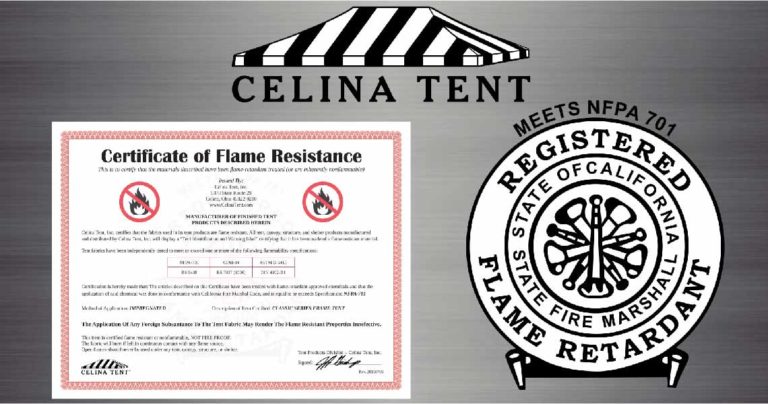Why Fire in Tents is a Bad Idea

Heat and Heating: A Tent’s Guide
As winter weather begins to loom on the horizon tent events begin to start planning for ways to keep their tents out longer. They check their guy lines and anchor, make sure they are avoiding wind whip, and install walls and climate controls to make sure the interiors of their shelters are the most comfortable for their guests. I believe it was Aristotle, or maybe Frankenstein’s Monster, who once said, “FIRE BAD.” It was this powerful statement that ushered in a new age of safety and understanding for tent users worldwide. It may seem like a no-brainer to most that you shouldn’t have fire under a tent, but there are still those who try it again and again. They say things like the following.
1: “These Tents Have Flame Certificates – They Can’t Burn!”
First off, we aren’t even going to touch on the “flammable” versus “inflammable” thing – they mean the same, English is strange, yadda yadda yadda. Some people tend to look at the Flame Certification that we give to tents as an anti-burning guarantee, which is stretching the truth a big.
Any fabrics that are to be used to house people are required to have some form of flame retardant properties added to them in order to keep a fire from quickly spreading or to keep burning when away from the ignition source. Because of the make up of fabric, they will all burn when exposed to open flame or to sources of high heat for extended periods of time. Until such a time as we figure out how to economically create tents from color-changing crystals or flexible aluminum sheeting, this is the best alternative.
You can see our fire certification explanation video here.
2: “I Have a Fire in my Tent When Winter Camping; I Know What I’m Doing.”
Good for you – we’re glad you have a hobby. However, there are two different reasons why you should not have fire in your tents. First of all, most large-scale tent events have many, many guests, and keeping an eye on every person around a fire is hard enough when it’s a small group of friends, let alone when you have people constantly coming and going. While what you do in your own time is completely up to you, hosting events with tents extends that particular danger to many others.
Second, AS THOUGH YOU NEED ANY REASON BEYOND THE SAFETY OF YOUR GUESTS, is that use of fire within your shelter will void your warranty.
3: “I’ve Had Fires in Tents Before. Still Haven’t Burned One Down.”
And I have driven many, many times on the road to visit my parents. That’s not to say that I will never be hit by an out of control car that’s lost its breaks just because I’ve never run across it before; I wear my seat belt just the same. Celina Tent wants to convey to our readership that the safest methods should always be the standard methods. This way you never have to worry about whether your jump line comes un-tied and swings down into the fire, Final-Destination-style to light your fabric top. Don’t put a fire in there in the first place and you won’t be tempting unlucky fate.
All of that being said, there are several types of heating that are much more manageable when you host a tent event in the cold, including some very good walls and various heaters and ducting. Any and all questions can be directed to our Customer Account Managers, or by emailing sales@gettent.com.
